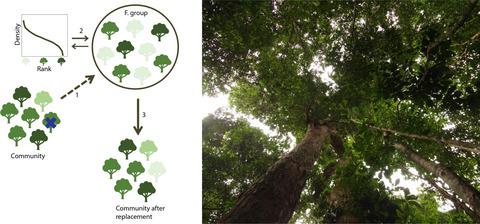Our official English website, www.x-mol.net, welcomes your feedback! (Note: you will need to create a separate account there.)
Functional groups, determinism and the dynamics of a tropical forest
Journal of Ecology ( IF 5.5 ) Pub Date : 2021-10-22 , DOI: 10.1111/1365-2745.13795 Vanessa E. Rubio 1 , Nathan G. Swenson 1
中文翻译:

功能群、决定论和热带森林的动态
更新日期:2021-10-22
Journal of Ecology ( IF 5.5 ) Pub Date : 2021-10-22 , DOI: 10.1111/1365-2745.13795 Vanessa E. Rubio 1 , Nathan G. Swenson 1
Affiliation

|
- Unravelling the drivers of forests dynamics is one of the main challenges in tree community ecology. These drivers include niche differentiation, dispersal limitation and stochasticity. Previous work has demonstrated that these mechanisms likely interact such that no one process is responsible for forest dynamics.
- One possibility is that the functional composition in a forest changes in a deterministic fashion, but the abundances of individual species that are functionally similar and have similar life-history strategies drift in a neutral fashion. This framework aligns with the functional group-based version of the neutral theory proposed more than 30 years ago, but it has remained poorly understood and is not well-integrated in tree community ecology.
- To investigate the possibility that determinism and neutrality may operate on the functional and species levels, respectively, we studied the long-term dynamics of trees on Barro Colorado Island, Panama. Specifically, we sorted tree species into functional groups. We defined them as groups of species that cluster together based upon continuous functional trait measurements that are believed to reflect key life-history trade-offs. This information was then used to quantify the observed species and functional group dynamics in the forest and to compare them to that expected from neutral simulations.
- We found that forest dynamics are likely governed by deterministic processes at the between-functional group level where species relative abundances change or drift through time within group. Species rank distributions for each functional group remained relatively stable suggesting that these groups may act as broad adaptive zones for both common and rare species that may promote species coexistence. Moreover, we found that these functional groups associate with different habitats in the forest.
- Synthesis. The results indicate that deterministic processes control the relative proportion of each functional group in the tropical forest studied and that individual species within groups may have apparently neutral dynamics. Furthermore, the results demonstrate that observed stable functional group relative proportions can be produced by deterministic or neutral dynamics, which underscores the importance of comparing the observed functional dynamics to that expected under neutral dynamics.
中文翻译:

功能群、决定论和热带森林的动态
- 解开森林动态的驱动因素是树木群落生态学的主要挑战之一。这些驱动因素包括利基分化、分散限制和随机性。以前的工作表明,这些机制可能相互作用,因此没有一个过程对森林动态负责。
- 一种可能性是森林中的功能组成以一种确定性的方式变化,但功能相似且具有相似生活史策略的个体物种的丰度以中性方式漂移。这个框架与30 多年前提出的基于官能团的中性理论版本一致,但它仍然知之甚少,也没有很好地融入树木群落生态学。
- 为了研究确定性和中立性分别在功能和物种水平上起作用的可能性,我们研究了巴拿马巴罗科罗拉多岛树木的长期动态。具体来说,我们将树种分类为功能组。我们将它们定义为基于连续功能性状测量聚集在一起的物种群体,这些测量被认为反映了关键的生活史权衡。然后使用该信息量化森林中观察到的物种和功能组动态,并将它们与中性模拟的预期进行比较。
- 我们发现森林动态可能受功能组间水平的确定性过程控制,其中物种相对丰度在组内随时间变化或漂移。每个功能组的物种等级分布保持相对稳定,这表明这些组可以作为常见和稀有物种的广泛适应区,可能促进物种共存。此外,我们发现这些功能组与森林中的不同栖息地有关。
- 合成。结果表明,确定性过程控制所研究的热带森林中每个功能组的相对比例,并且组内的单个物种可能具有明显的中性动态。此外,结果表明,观察到的稳定官能团相对比例可以通过确定性或中性动力学产生,这强调了将观察到的功能动力学与中性动力学下的预期进行比较的重要性。



























 京公网安备 11010802027423号
京公网安备 11010802027423号